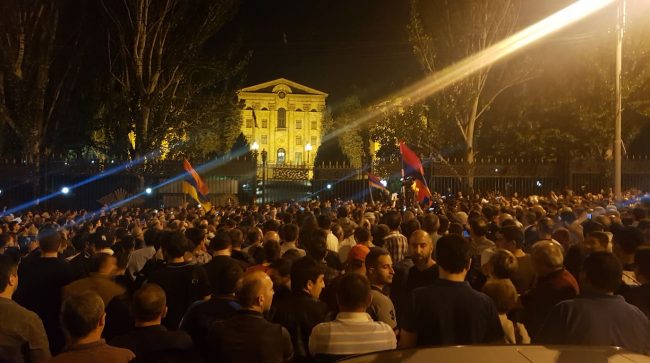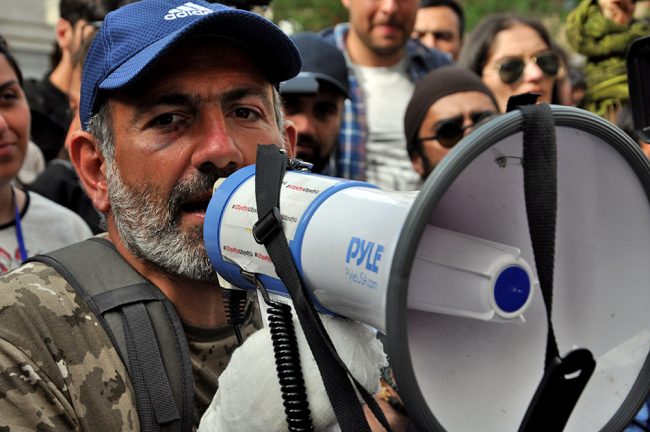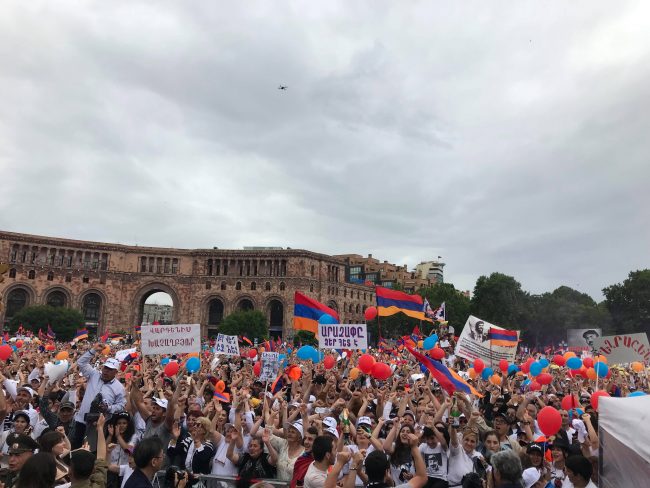

 Thousands took to the streets in Yerevan on Tuesday night after calls from Armenian Prime Minister Nikol Pashinyan to protest an attempted ‘counter-revolution’ by the country’s parliament, the National Assembly.
Thousands took to the streets in Yerevan on Tuesday night after calls from Armenian Prime Minister Nikol Pashinyan to protest an attempted ‘counter-revolution’ by the country’s parliament, the National Assembly.
On Tuesday evening, MPs from the Prosperous Armenia Party and Armenian Revolutionary Federation (ARF), both members of Pashinyan’s governing coalition, joined with the opposition Republican Party in an extraordinary parliamentary session announced on previous day to approve new rules that could hinder Pashinyan from calling early elections.
The consecutive second and final hearings on the draft law were not televised.
Pashinyan said in a Facebook Live broadcast: ‘legislators that support this draft law want corrupted power to get revenge against the government, and obviously, we won’t let that happened’, before heading to the protest.
Smaller protests were also held in Gyumri and Vanadzor.
Addressing the crowds gathered outside the National Assembly, the PM read out the names of governors and cabinet ministers from the Prosperous Armenia and ARF — accusing them of ‘conspiring against the authorities’ — and announcing he was firing them. Both Prosperous Armenia and ARF are the members of Tsarukyan Alliance in the National Assembly.
In an emotional speech to the crowds the PM fulminated against the Republican Party, suggesting it should be ‘eradicated’. Pashinyan said that with their latest step, ‘the RPA and their allies had officially announced a counter-revolution’.
He called on President Sarkissian to forward the bill to the Constitutional Court instead of signing it.

After his speech, Pashinyan called on demonstrators to preserve order, announcing he would enter the National Assembly building to negotiate with his opponents.
After holding talks with parliamentary factions for two hours, the PM emerged and told demonstrators that snap elections would be held in December.
He said he planned to resign ‘within several days’, and that other parties had promised during talks not to put forward a candidate for Prime Minister.
If the prime minister resigns, the National Assembly has one week to elect a new PM. Failure to elect a new prime minister twice in a row automatically triggers early parliamentary elections.
The following day however, all parliamentary factions, including Pashinyan’s Yelk faction confirmed they had not yet reached an agreement. Talks between Pashinyan and other parliamentary parties are expected to continue.
New rules
The amendments to the ‘Rules of Procedure of the National Assembly’ concern changes to the way parliament appoints a new prime minister if the current one resigns.
It would automatically extend the deadline for the National Assembly to appoint a new PM if parliament fails to convene due to an absence of quorum — if there are not enough MPs present to vote.
There had been speculation Pashinyan might try to force a snap election by resigning, and then calling for protesters to physically block MPs from appointing a replacement.
Republican Party spokesperson and Vice Speaker Eduard Sharmazanov told media on Wednesday that the bill would not prevent snap elections from being held, and was only meant to secure the workings of the National Assembly from outside ‘pressure’.
The law still needs to be signed by President Armen Sarkissian.
Wednesday, Sarkissian formalised the firings of ministers previously in Pashinyan’s government with his signature.
Six of the 11 cabinet members were fired, the ministers of: Energy Infrastructure and Natural Resources, Economic Development, Agriculture, Transportation, Emergency Situations, and the Sports and Youth Affairs.
According to the President’s office, Sarkissian was closely following developments while on a working visit to New York, and had already talked by phone with the PM and the Chair of National Assembly, Republican Ara Babloyan.
He urged all parties ‘to remain calm and tolerant towards each other’, and promised to address the issue of the latest amendment after returning to Armenia.
Snap elections
Pashinyan has promised to hold early elections since coming to power in a popular revolution in May.
[Read on OC Media: Analysis | Heard but not seen: how women became the unrecognised architects of the Velvet Revolution]
After his My Step bloc won a landslide victory in snap elections for Yerevan City Council on 23 September, Pashinyan said that parliamentary elections were ‘unavoidable’ and that he would consult with other parties to agree a date.

On Monday, negotiations broke down between Pashinyan and Vahram Baghdasaryan, the head of the opposition Republican Party, which remains the largest party in the National Assembly.
Pashinyan finally announced several hours before Tuesday evening’s vote on his Facebook page that the snap parliamentary election would be held in November or December.
On 3 October, the Parliamentary Assembly of the Council of Europe (PACE) rapporteur for the monitoring of Armenia Yuliya Lovochkina called on Armenian authorities to ensure that all political forces in the country have proper and sufficient time to prepare themselves for the next parliamentary elections.






